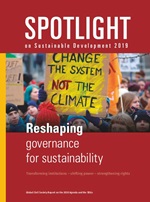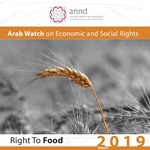Social Watch news
Published on Wed, 2019-09-18 21:03
With the focus firmly on preparations for the UN General Assembly (UNGA) High-Level Week (23-27 September), the Presidents of the General Assembly (PGAs) and the UN Secretary-General expressed their concerns and ambitions in closing the 73rd Session and opening the 74th Session.
While the UNGA High-Level Week will feature high-level meetings on climate, universal health coverage, financing for development, the Sustainable Development Goals (SDGs), and solutions for Small Island Developing States (SIDS), the UNGA’s remit goes far beyond that week, with meetings spanning the entire year, and a new session beginning each September.
|
Published on Mon, 2019-09-16 12:09
The 2030 Agenda for Sustainable Development clearly identifies several issues, ranging from finances, to climate to trade, where global governance agreement is required. But actual decisions on these issues often run in the opposite direction. Non-accountable ‘clubs’ exercise de facto authority and raise obstacles to implementing the SDGs.
While leaders of all UN Member States decided on a transformative agenda for 2030, a de facto form of global governance, sometimes called ‘shadow governance’, works in the opposite direction. Operating in opposition to global norms as self-selected ’coalitions of the willing’ or in the interstices of national sovereignties-such as the global ‘shadow banking’ where illegal financial flows meet established financial arrangements- these major obstacles to achieving the SDGs are not loose trends or wild forces beyond control, but rather the result of a secretive but efficient network of governance ‘clubs’ that operate beyond public scrutiny or parliamentary oversight, the two accountability mechanisms identified in the 2030 Agenda.
|
Published on Mon, 2019-09-16 12:00
Climate change is increasingly making its impact felt worldwide. Everyone is suffering, but the poor in the developing world is bearing the brunt of the impacts. It is not fair that those who did not contribute to the problem of climate change are suffering the most, and sometimes even paying with their lives. The developed world, historically responsible for causing climate change must own responsibility and fulfil longstanding commitments to reduce emissions and provide developing countries the means—finance, technology, capacity building—to deal with climate change.
Under the Paris Agreement on climate change countries agreed to climate action via nationally determined contributions (NDCs). Developed countries have been mandated to help developing countries with the means to achieve their climate goals. However, they have reneged on their commitments time and again. This cannot continue.
|
Published on Mon, 2019-09-16 11:23
Arab NGO Network for Development (ANND) hosts an electronic platform to share information and reports on the progress in the implementation of the Agenda 2030 for Sustainable Development issued by CSOs in the Arab Region.
|
Published on Fri, 2019-09-13 13:22
Civil Society watchdog says the UN week of summits 23-27 September could see more positive action on the climate emergency, on implementing the Sustainable Development Goals and could change the direction of financing for development.
|
Published on Wed, 2019-09-11 12:06
Four years after the adoption of the 2030 Agenda the world is off-track to achieve the Sustainable Development Goals (SDGs). In order to turn the transformational vision of the 2030 Agenda into real transformational policies, there needs to be a shift towards more coherent fiscal and regulatory policies. In addition, policy coherence for sustainable development requires to fully take into account the externalities and spill-over effects of European policies, production and consumption patterns. With an emphasis on environmental and social impact beyond our borders, the "Spotlight Report Sustainability in Europe. Who is paying the Bill?" will be presented in Brussels on September 11, 2019.
|
Published on Tue, 2019-09-10 14:55
In the 2030 Agenda for Sustainable Development, UN Member States commited to “reach the furthest behind first”. Can this commitment be applied to governance and related policies, budgets and institutions?
Barbara Adams explores the implications for global governance of the promises of the 2030 Agenda, the practice of the High-level Political Forum (HLPF) and the many and sometimes contradictory approaches and initiatives of the UN system and its ‘governors’.
This analysis highlights the need to move from the current pay-to-play orientation to one of democratic accountability for ‘people and planet’ and recommends a strengthened and re-positioned HLPF and UN General Assembly to drive momentum for the UN as the leader of rights-based multilateralism.
|
Published on Tue, 2019-09-10 14:52
Human rights are explicitly inscribed in the purpose, vision and normative foundations of the 2030 Agenda for Sustainable Development and the Sustainable Development Goals (SDGs). This grounding of Agenda 2030 in human rights standards – a hard-won civil society victory – represents an enormously significant evolution in the historically uneasy relationship between human rights and development in the global governance arena.
If human rights are to help the SDGs “transform our world”, three fundamental steps are needed to disrupt the selectivity and hypocrisy still surrounding the issue in the sphere of global development governance. First, human rights must be articulated and understood holistically, encompassing their economic, social and environmental dimensions, and recognizing their relevance to the entirety of the 2030 Agenda, not just Goal 16 on peaceful and just societies.
|
Published on Mon, 2019-09-02 14:57
The right to food is a priority at the global level, and especially in the Arab region where countries with heightened armed conflicts as Syria, Yemen, Iraq and Palestine suffer from severe malnutrition. And yet, conflicts are not the only reason behind the deterioration in the food situation, because it is primarily due to the social and economic policies adopted, as well as climate change and change in production and consumption patterns. In fact, these policies have had a significant impact on small producers and rural populations.
To better understand the setbacks for the right to food, the Arab Watch Report 2019 raises these concerns through 10 national and six regional papers, which all adopt an all-encompassing approach to the right to food and its aspects.
|
Published on Wed, 2019-08-28 16:42
Over a hundred Heads of State or Government are expected to arrive to New York in the last week of September for a series of back-to-back summit meetings at the opening of the General Assembly of the United Nations. On top of the usual photo opportunities and a myriad of bilateral meetings between leaders, this High-level week provides an opportunity for multilateral action to shift away from ‘business as usual’ and address some enormous current challenges.
|
SUSCRIBE TO OUR NEWSLETTER
Submit

|








